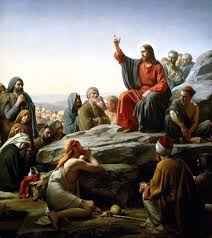Seek Ye First The Kingdom of God And...
Seeking First the Kingdom of God, And….
There Are Legal Prerequisites for Entering the Kingdom
There are legal prerequisites for entering the kingdom of heaven. And in order for us to enter the Kingdom of God we must meet those legal prerequisites. And those legal prerequisites are found in the Gospel of the Kingdom.
“Enter ye in at the strait gate: for wide is the gate, and broad is the way, that leadeth to destruction, and many there be which go in thereat: Because strait is the gate, and narrow is the way, which leadeth unto life, and few there be that find it” (Mat. 7:13, 14; KJV).
The Church Does Not Acknowledge the Difficulty
Matthew 19:17–in speaking to the Rich Young Ruler, Master says to him: “Why callest thou me good? There is none good but one, that is, God: but, if thou wilt enter into life, KEEP THE COMMANDMENTS” (KJV).
Commandment-Keeping and the Kingdom
The Narrow Way and the Strait Gate Focus of Yeshua
Matthew 19:21–If thou wilt be perfect, go and sell that thou hast, and give to the poor, and thou shalt have treasure in heaven: and come and follow Me” (KJV).
Failure to Meet the Requirements For the Kingdom
“Seek ye first the kingdom of God and His righteousness… and all these things will be added unto you (Mat. 6:33).

It was during the famous Sermon on the Mount that Yeshua provided us the rules to the Kingdom of God and admonished us to seek first the Kingdom of God and His Righteousness.
This famous instruction given by our Master is part of the “Sermon on the Mount” where He declared to His disciples the “rules of the Kingdom” (Matthew 5:1-7:29).
An Important Message For Those Who Climbed the Hill to Hear It
Matthew 5:1–“And seeing the multitudes, He (ie., Yeshua) went up into a mountain: and when He was set, His disciples came unto Him and He opened His mouth and taught them…” (KJV).
Each of us Must Make the Climb Up the Hill
The Rules of the Kingdom Oppose Religion
Yeshua Clarified Torah For Us
Matthew 5:17–“Think not that I am come to destroy the Law (Torah), or the prophets: I am not come to destroy, but to fulfill” (KJV); Isaiah 42:21–YHVH is well pleased for His righteousness’ sake; He will magnify the Law (ie., Torah) and make it glorious” (KJV). Romans 10:4–For Christ is the end of the Law for righteousness to every one that believeth” (KJV).
The Rules of the Kingdom Equal Torah Instruction
Matthew 15:6–“…ye (ie., you Pharisees and Scribes) made the commandment of God of none effect by your tradition” (KJV).
The Rules of the Kingdom Constitute Proper Godly Behavior
-
Humility–the humbleness–the pious poor–of whom God especially cares (Psm. 14:6; 22:24; 25:16; 34:6; 40:17; 69-29). These are seen as being in a state of spiritual bankruptcy (Mat. 5:3).
-
Mourn–those that are spiritually, emotionally or financially lost because of sin resulting in a longing for Father’s forgiveness and healing. These lament the sinful lives they’ve lived; the wasted years they pursued other gods and rejected or ignored the One True God. These followed after their own desires. (2 Cor. 7:10). (Mat. 5:4).
-
Teachable–Those who don’t assert themselves over others in order to further their own agendas in their own strength, but who will ultimately be in positions of rulership in the world tomorrow (Mat. 5:5).
-
Desirous of righteousness–those who long for the righteous character Yehovah and these will be satisfied to overflowing through the invitation to be in intimate relationship with the Almighty (Mat. 5:6).
-
Merciful–those that show mercy unto others–these will be shown mercy from the Creator of the Universe (Mat. 5:7).
-
Purity of heart which succeeds that of external ritual purity. Master taught that purity of heart was one of the most important aspects of His disciples’ live–Mat. 5:28). (Mat. 5:8). Jer. 17:10–I the LORD search the heart, I try the reins, even to give every man according to his ways, and according to the fruit of his doings (KJV). Jer. 29:13–And ye shall seek me, and find me, when ye shall search for me with all your heart (KJV).
-
Peacemakers–that advocate shalom in the Body of Messiah–will be called Sons of God, for they reflect the true character of their heavenly Father (Mat. 5:9).
-
All the martyrs and those who are and were tribulated by the world for the sake of Messiah, for they will enter the Kingdom of God (Mat. 5:10-12). Great will be their reward. Martyrdom and persecution are the natural birthrights of true disciples of Yeshua Messiah.
-
Salt and light of the earth (Mat. 5:13-16)–those that do good works and glorify Abba who is in heaven.
-
Those that do not diminish nor augment Torah–God’s word. Whoever shall break break one of these least commandments of Torah and teaches others to do also shall be called the least in the Kingdom of Heaven. But those that teach and obey Torah shall be called great in the Kingdom of Heaven (Mat. 5:17-19).
Our Righteousness Must Exceed That of the Religious Leaders of Yeshua’s Day
The Level of Righteousness to Enter God’s Kingdom is High
- Murder versus hating someone without right cause (vss 21-26) Thus we must do everything we possibly can to ensure we are in right standing with others in this life if we expect to enter the kingdom of heaven. We cannot hold grudges nor hate for no reason.
- Adultery versus lusting after another (vss. 27-30). If we have such a problem, in order for us to make it into the kingdom, we must get it fixed.
-
Improper marrying versus adultery = legalized adultery (vss. 31-32). Far too many people use divorce as a means to easily get out a marriage, only to afford them an opportunity to marry someone else. God’s prescription for marriage allowed for divorce/dissolution of marriage in cases of adultery. Remarriage is permitted only in the case of the death of one of the partners.
-
Making improper oaths unto Yehovah–oaths that you don’t intend to keep. Yet religion in Yeshua’s day facilitated the breaking of oaths through manmade loopholes in Torah (Deu. 6:13; 10:20; Num. 30:2). We must keep our vows to YHVH. If you don’t intend to keep a vow, you must not make it and certainly do not look for ways to circumvent fulfilling vows made unto God (vss. 33-37).
Treatment of One Another Under the Rules of the Kingdom
The Oral Tradition Contrary to the Eternal Principles of Torah
Forgiveness Is Essential For Entering the Kingdom
Our Focus Must Be on Things Eternal–Not on Things of this Life
-
What we’re going to eat.
-
What we’re going to drink.
-
What we’re going to have to wear.
-
In fact, Master requires that we not be distracted by continually chasing after food, drink, and clothing–nails–hair–stuff as the gentiles endlessly pursue such insignificant things.
Seeking Out the Kingdom of God and His Righteousness
Faithfully
Waking-up From the Slumber-Feast of Tabernacles 2024-Kenya
Join Rod Thomas in this enlightening episode of the Messianic Torah Observer as he discusses the significance of the upcoming Spring Feasts, including Passover and the Feast of Unleavened Bread. Dive deep into the spiritual implications of these sacred times,...
Learning to Leave Well Enough Alone-Thoughts and Reflections on Torah Reading 24
Podcast Episode: Learning to Leave Well Enough Alone - Thoughts and Reflections on Torah Reading 24 In this episode of the Messianic Torah Observer, Rod Thomas delves into Torah Reading 24, titled "Learning to Leave Well Enough Alone." Rod reflects on...
The Two Afflictions That Get God’s Attention
Messianic Torah Observer Podcast Episode: The Two Afflictions That Get God's Attention Host: Rod Thomas Date: April 3, 2025 Episode Summary: In this episode, Rod Thomas shares his thoughts ahead of the spring feast and discusses the significance of Yom Kippur, the Day...
Shabbat HaChodesh-the Sabbath Before Biblical Rosh HaShannah 2025
Greetings and Introductions Greetings saints of the Most High. Welcome to another installment of the Messianic Torah Observer. Rod Thomas coming to you on a beautiful spring midweek day here in the DFW. I want to thank you for taking the time out of your busy...
Unlocking the Keys to the Kingdom Part 2: Binding and Loosing on Earth and in Heaven
Greetings and Introductions Greetings saints of the Most High. Welcome to another installment of the Messianic Torah Observer. Rod Thomas coming to you on a beautiful Spring midweek day here in the DFW. I want to thank you for taking the time out of your busy...
Unlocking the Keys to the Kingdom: Understanding Yeshua’s Teachings in Light of Torah
Greetings and Introductions Greetings saints of the Most High. Welcome to another installment of the Messianic Torah Observer. Rod Thomas coming to you on a beautiful Spring Preparation Day here in the DFW. I want to thank you for taking the time out of your busy...
Shabbat Zachor – Blotting out the Spirit of Esau in the Lives of God’s People
Greetings and Introductions As I am publishing this discussion, it is the 6th day of the 12th month on Yah's sacred calendar year, which translates to March 7, 2025. And we are potentially less than a month away from biblical Rosh HaShannah. As we near the end of this...
Understanding our Melchizedekian Priestly Pedigree-Part 4: Jasher’s Hidden Chronicles of the Melchizedekian Priesthood
Greetings, saints of the Most High! Welcome to another installment of the Messianic Torah Observer. Today, we delve into the intriguing topic of our Melchizedekian Priestly Pedigree, focusing on Jasher’s hidden chronicles. In Part 3, we explored the theological...
Understanding our Melchizedekian Priestly Pedigree-Part 3 : The Theological Implications of the Avram-Melchizedek Encounter
I. Greetings and Introductions Greetings saints of the Most High. Welcome to another installment of the Messianic Torah Observer. Rod Thomas coming to you on a cold, overcast Preparation Day in the DFW. Thank you for taking the time out of your...
Understanding our Melchizedekian Priestly Pedigree-Part 2 : Abram’s Melchizedek
This is "Understanding our Melchizedekian Priestly Pedigree Part 2: Avram’s Melchizedek.” Rehash of Part 1: The Royal Priesthood: Exploring the Historical, Spiritual, and Eschatological Roles of Melchizedek - Part 1 In part one of this...


0 Comments